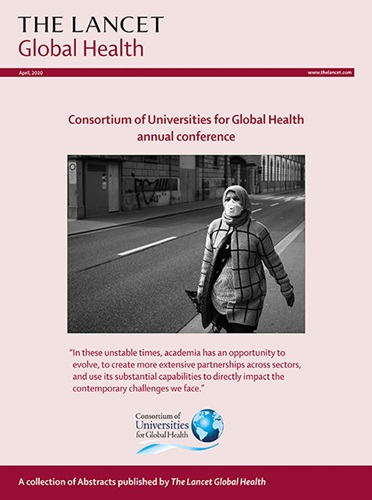Effects and costs of a multi-component menstrual health intervention (MENISCUS) on mental health problems, educational performance, and menstrual health in Ugandan secondary schools: an open-label, school-based, cluster-randomised controlled trial.
IF 19.9
1区 医学
Q1 PUBLIC, ENVIRONMENTAL & OCCUPATIONAL HEALTH
引用次数: 0
Abstract
BACKGROUND Menstrual health is a human rights issue, affecting many aspects of life including mental health, wellbeing, and education. We assessed the effectiveness and costs of a school-based, multi-component menstrual health intervention (MENISCUS) to improve mental health problems and educational performance among in-school adolescents. METHODS We conducted a parallel-arm, cluster-randomised trial in secondary schools in Wakiso and Kalungu districts in Uganda. Schools were eligible for inclusion if they had both male and female students; senior 1-4 classes; day or mixed day and boarding students; at least minimal water, sanitation, and hygiene (WASH) facilities; and enrolments of 50-125 female Senior 1 students in Wakiso district and 40-125 female Senior 1 students in Kalungu district. Schools were randomised (1:1) to the intervention or control condition, stratified by district and baseline mean school examination score. The intervention included creating action groups, strengthening teacher-delivered puberty education, distributing menstrual kits, supporting student-led drama skits, providing pain-management strategies, and improving school water and sanitation facilities. The control condition was provision of printed government menstrual health materials. Schools, participants, and implementors, including the study clinician who monitored adverse events, could not be masked to allocation status. Primary outcomes were mental health problems using the Strength and Difficulties Questionnaire (SDQ) Total Difficulties Score and independently assessed educational performance at individual level, assessed in all female participants at endline. We estimated cluster-intention-to-treat intervention effects using mixed-effects models accounting for school clustering and adjusted for randomisation strata and baseline school-level means of outcomes. The study was registered at the ISRCTN registry, ISRCTN45461276 and is completed. FINDINGS 60 randomly selected schools (44 from Wakiso and 16 from Kalungu) were randomly assigned (30 per group) to the intervention or the control group, and none withdrew. Between March 21 and July 5, 2022, 3841 female students participated in baseline assessments (89·7% of those eligible) and between June 5 and Aug 22, 2023, 3356 participated in endline assessments (1666 in the control group and 1690 in the intervention group). Female participants had a median age of 16 years (IQR 15-16). At endline, there was no evidence of a difference in mental health problems (mean SDQ score, 10·8 in the intervention group vs 10·7 in the control group; adjusted mean difference [aMD] 0·05 [95% CI -0·40 to 0·50]) nor educational performance (mean z score, 0·20 in the intervention group vs 0·12 in the control group; aMD 0·05 [95% CI -0·10 to 0·19]), despite improvements to menstrual health. The annual implementation cost was US$85 per Senior 2 female student. One participant had a serious adverse event (severe anaemia secondary to excess vaginal bleeding), which was deemed to be possibly related to the intervention. INTERPRETATION Improving multiple dimensions of menstrual health in secondary schools in Uganda is important for health and human rights but is not sufficient to improve mental health or educational performance over 1 year. FUNDING UK Foreign, Commonwealth and Development Office; Medical Research Council; Department of Health and Social Care; and Wellcome.多组分月经健康干预(MENISCUS)对乌干达中学心理健康问题、教育表现和月经健康的影响和成本:一项开放标签、以学校为基础的聚类随机对照试验
月经健康是一个人权问题,影响生活的许多方面,包括心理健康、福祉和教育。我们评估了以学校为基础的多组分月经健康干预(MENISCUS)的有效性和成本,以改善在校青少年的心理健康问题和教育表现。方法我们在乌干达Wakiso和Kalungu地区的中学进行了一项平行分组随机试验。如果学校既有男学生也有女学生,就有资格纳入;高级1-4班;全日制或混合制和寄宿学生;至少有最低限度的水、环境卫生和个人卫生设施;瓦基索区50-125名女高中一年级学生和卡伦古区40-125名女高中一年级学生的入学人数。学校被随机(1:1)分配到干预或控制条件,按地区和基线平均学校考试分数分层。干预措施包括建立行动小组,加强教师提供的青春期教育,分发月经包,支持学生主导的戏剧小品,提供疼痛管理策略,以及改善学校的供水和卫生设施。对照条件为提供印刷版政府经期卫生资料。学校、参与者和实施者,包括监测不良事件的研究临床医生,都不能掩盖分配状态。主要结果是心理健康问题,使用力量和困难问卷(SDQ)总困难评分和独立评估个人水平的教育表现,在终点对所有女性参与者进行评估。我们使用考虑学校聚类的混合效应模型估计集群意向治疗干预效果,并根据随机分层和基线学校水平结果进行调整。该研究已在ISRCTN注册中心ISRCTN45461276注册,并已完成。结果:60所随机选择的学校(44所来自Wakiso, 16所来自Kalungu)被随机分配到干预组或对照组(每组30所),没有一所退出。在2022年3月21日至7月5日期间,3841名女学生参加了基线评估,占符合条件的86.7%;在2023年6月5日至8月22日期间,3356名女学生参加了终点评估(对照组1666名,干预组1690名)。女性参与者的中位年龄为16岁(IQR 15-16)。在结束时,没有证据表明心理健康问题有差异(干预组的平均SDQ评分为10.8,对照组为10.7;调整平均差[aMD] 0.05 [95% CI - 0.40 ~ 0.50])和教育成绩(平均z分,干预组为0.20,对照组为0.12;aMD 0.05 [95% CI - 0.10至0.19]),尽管月经健康有所改善。每年的实施成本为每位高二女生85美元。一名参与者有严重的不良事件(严重贫血继发于阴道过多出血),这被认为可能与干预有关。解释:改善乌干达中学经期健康的多个方面对健康和人权很重要,但不足以改善心理健康或一年以上的教育成绩。英国外交、联邦和发展部;医学研究理事会;卫生和社会保障部;和威康。
本文章由计算机程序翻译,如有差异,请以英文原文为准。
求助全文
约1分钟内获得全文
求助全文
来源期刊

Lancet Global Health
PUBLIC, ENVIRONMENTAL & OCCUPATIONAL HEALTH-
CiteScore
44.10
自引率
1.20%
发文量
763
审稿时长
10 weeks
期刊介绍:
The Lancet Global Health is an online publication that releases monthly open access (subscription-free) issues.Each issue includes original research, commentary, and correspondence.In addition to this, the publication also provides regular blog posts.
The main focus of The Lancet Global Health is on disadvantaged populations, which can include both entire economic regions and marginalized groups within prosperous nations.The publication prefers to cover topics related to reproductive, maternal, neonatal, child, and adolescent health; infectious diseases (including neglected tropical diseases); non-communicable diseases; mental health; the global health workforce; health systems; surgery; and health policy.
 求助内容:
求助内容: 应助结果提醒方式:
应助结果提醒方式:


